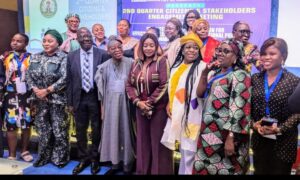

By Our Correspondent, Lagos.

The Minister of Marine and Blue Economy, Alhaji Adegboyega Oyetola, has announced that Nigeria has maintained zero incidents of piracy in its waters for three consecutive years, attributing the achievement to the successful implementation of the Deep Blue Project.
Speaking during a one-day stakeholder engagement held in Lagos on Thursday, Oyetola described maritime security as a cornerstone of the ministry’s mandate, adding tha the progress had earned Nigeria international recognition and contributed to regional maritime stability.
He disclosed that Nigeria’s offer to host the African Union Combined Maritime Task Force in Lagos had been endorsed by the AU Peace and Security Council.
The minister praised the efforts of stakeholders, noting that their support aligns with President Bola Ahmed Tinubu’s Renewed Hope Agenda, which aims to reposition the marine and blue economy sector for sustainable national development.
“The creation of the Marine and Blue Economy Ministry is a major reform, and the approval of its national policy marks a critical turning point,” Oyetola stated.
The policy framework, he said, covers key areas such as port infrastructure, maritime security, aquaculture, ocean governance, marine biotechnology, renewable energy, coastal tourism, and climate resilience.
“Our meeting today is not ceremonial. It is a working forum aimed at developing actionable frameworks, setting clear priorities, and assigning institutional responsibilities. We must strengthen coordination, ensure accountability, and build capacity at all operational levels,” he added.
Oyetola also revealed that a Nigeria-flagged vessel berthed at Tincan Island Port on July 2, carrying 359 containers of cargo—a milestone in promoting indigenous shipping.
Since the ministry’s establishment in 2023, Oyetola said it has collaborated with its agencies to effectively implement key ministerial deliverables. A performance review by the Presidential Policy Office and CRDCU rated the ministry’s 2024 scorecard at 75 percent.
He commended the Delivery Task Teams for their dedication and urged continued focus and excellence.
The minister listed the modernisation of port infrastructure as a top priority, with rehabilitation contracts for Apapa and Tin Can Island Ports already approved and procurement for Eastern ports underway.
He added that digital platforms such as the Port Community System and the E-Call-Up System were being deployed to reduce delays and enhance investor confidence.
Oyetola said the ministry is working to strengthen indigenous shipping capacity and revive the National Carrier through a public-private partnership. He confirmed that NIMASA had begun preparations for the disbursement of the Cabotage Vessel Financing Fund (CVFF), which would follow a transparent process.
“When operational, the CVFF will significantly improve access to funding for Nigerian shipping operators,” he noted.
On revenue generation and service delivery, Oyetola reported consistent growth, improved operational efficiency, closure of leakages, and an increase in private sector investment.
He also highlighted the National Inland Waterways Authority (NIWA)’s achievements in implementing the 2023 Inland Waterways Transportation Regulation and rolling out a nationwide water safety campaign. This includes the distribution of over 42,000 life jackets, deployment of ferries and patrol boats, and training of marshals, which has led to a reduction in boat mishaps.
In his remarks, the Comptroller-General of Customs, Bashir Adewale Adeniyi, represented by Comptroller Patrick Ntadi, urged stakeholders to remain committed to harnessing the full potential of Nigeria’s maritime resources.
Dr. Odunayo Ani, President of the Women’s International Shipping and Trading Association (WISTA) Nigeria, commended the ministry for introducing the National Marine and Blue Economy Policy. She said the policy reflected the government’s dedication to ocean governance, economic diversification, job creation, and environmental sustainability.
“WISTA and other women’s organizations are committed to supporting gender equity, capacity building, and innovation in the sector. We welcome the ministry’s recognition of women’s roles and will continue to advocate, train, and partner in driving this agenda,” Ani said.
Chief Greg Ogbeifun, former President of the Ship Owners Association of Nigeria, lauded the ministry’s efforts and called for increased private sector participation in the industry.
Also speaking, Mr. Godfrey Nwosu, General Secretary of the National Association of Government Approved Freight Forwarders (NAGAFF), expressed appreciation to the minister for introducing policies that have eliminated longstanding bottlenecks in the maritime sector.
Edited by Dada Ahmed.


